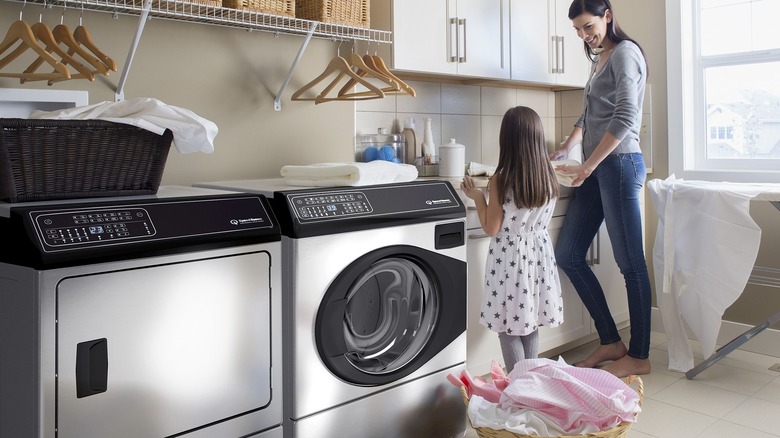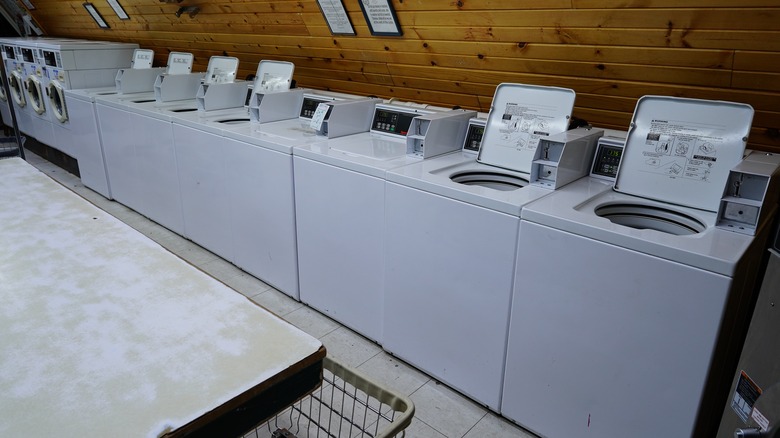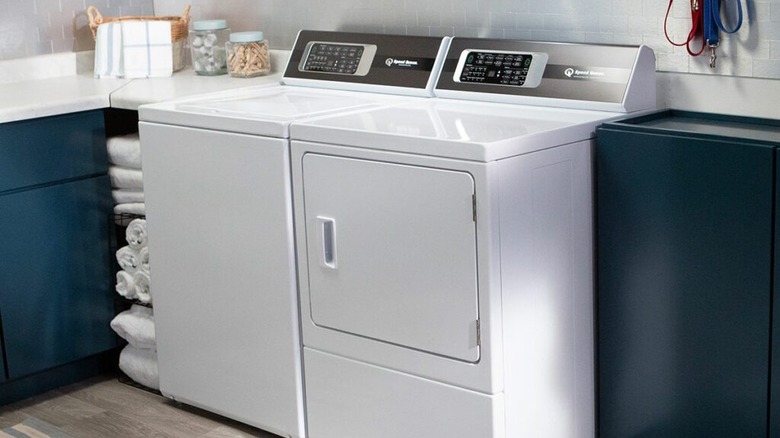Do Speed Queen Washing Machines Live Up To The Hype?
There's a vibe about Speed Queen washing machines. The company's brand and reputation are reminiscent of a '57 Chevy — heavy steel workhorses made in America. Its logo might look most at home stamped into a chromed metal badge on a 1950s appliance, but Speed Queen made bombproof washers well before WWII. These machines have a reputation for reliability that is unparalleled among modern appliances, and that reputation seems mostly deserved — at least until around 2019, when many started to detect some weaknesses in Speed Queen's revered products. Today, there seems to be good reason to believe a new Speed Queen won't always be the most reliable, fastest, or best washer on the market.
Speed Queen washers are built like tanks. The company primarily makes commercial machines and sells similar residential washers at very high prices. There's a retro-modern vibe to them that is functional rather than stylish. The control panel of a Speed Queen washer emphasizes the simplicity and ease of use of a laundromat machine. They make the heaviest washing machines on the market, blocky things that imply durability in every armored corner. Unsurprisingly, Speed Queen has a lot of fans among vintage appliance aficionados. In these communities, there's a sort of defiant traditionalist ethos that suggests something of a standoff between consumerism and technical modernity on one hand, and nostalgia and tough-as-nails history on the other. They want you to know that the old things worked better. But are new Speed Queen washers still built like the old things?
Speed Queen might not be that reliable
Fans of old-school appliances talk endlessly about reliability. Historically, Speed Queen's reliability suffered from few of the factors that make modern appliances less reliable than the old ones. The company built to last, tested very thoroughly, and would consider planned obsolescence an alien concept. Consumer Reports rates the reliability of the brand's agitator top-loader machines as "excellent," and a 2019 New York Times review of the Speed Queen Classic TC5 said they're the most durable consumer washers you can buy. Though the company makes front-loaders as well, it's synonymous with top-loading washing machines. So just how bombproof are Speed Queen top-loaders? Data from Yale Appliance — the company behind the reliability stats used in the New York Times' Speed Queen review — tells a troubling story.
In 2017, 2018, 2019, 2020, 2021, and 2022, Speed Queen's ratio of service calls to units purchased never performed better than third, behind companies like LG and Maytag. According to Eugene Pallas of Lorain Furniture and Appliance, the brand's boasts of a 25-year lifespan only means that the washer will survive for that long — not that it will do so without minor repairs like replacing parts that can cause your washing machine to shake like crazy. Echoing the vintage appliance enthusiasts, Pallas — who has almost 20-plus years of experience with washer repair and once refused to sell any washers other than Speed Queen — says no washer on the market today will last 20 years or more. If you want one with this kind of longevity, he says you should buy a 20-year-old machine and refurbish it.
Do they at least clean well?
Eugene Pallas has also been a vocal critic of Speed Queen's recent cleaning performance. He says in a YouTube video that the older Speed Queen models would clean just about anything, but the newer models — in which the tub rotates with the agitator — clear far less well. He has posted videos of entire wash cycles and their results to make his point. But others say poor cleaning performance is nothing new for Speed Queen. Wirecutter found what many already suspected: agitator washers wear your clothes out faster, and eco-friendly modes don't clean all that well. But it also found that Speed Queen machines don't clean any better on "Heavy Duty" mode than other, better washers do on their normal setting. Consumer Reports also found that newer versions of the TR7 — a model popular in vintage appliance circles — cleaned worse in its default "Eco" mode than most competing agitator-style washers.
The functionality changes that trouble Pallas seem to be a nod to concerns that Speed Queen's older models had an overly aggressive method of cleaning that damaged clothes, at least on their agitator models. Pallas now recommends front-loading instead of top-loading washing machines, which reportedly clean better and have about the same reliability as top-loaders. Technical modernity appears to be winning the war against nostalgia, even with less reliable washers, and Speed Queen's apparent decline means there's no player left in the market still making a stand for old-school durability and aggressive, reliable cleaning.


